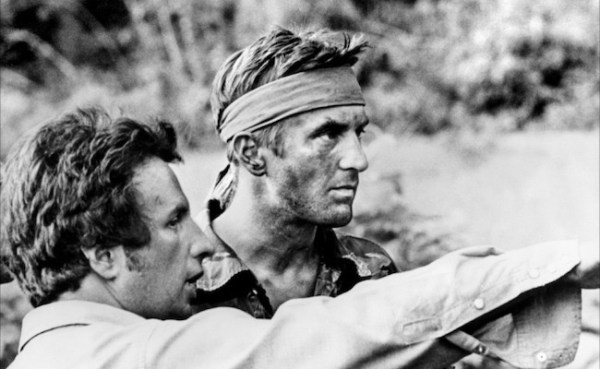
Michael Cimino, one of the defining directors of the 1970s has died, Variety and other sources are reporting. A controversial and mystery-shrouded figure, Cimino will always be inextricably linked to the rise and, especially, fall of an era defined by directorial freedom. Born in New York City in, by most accounts, in 1939, Cimino studied at Michigan State and Yale before becoming a sought-after director of commercials in the 1960s. From there he segued into screenwriting, co-writing the ecological science fiction film Silent Running and Magnum Force, the first sequel to Dirty Harry.
It was that latter film’s star, Clint Eastwood, who helped Cimino transition to directing, agreeing to star in Cimino’s Thunderbolt and Lightfoot alongside Jeff Bridges. A shaggy buddy movie that’s eventually overwhelmed by a creeping darkness and disillusionment, it provided a showcase for Cimino’s unhurried pacing and striking visuals and announced the arrival of a new voice ready to take on even more ambitious projects.
That chance arrived with The Deer Hunter, an unsparing look at the Vietnam war as experienced by the working class kids of a small Pennsylvania town. Starring Robert De Niro, Christopher Walken, John Cazale, and John Savage, the 1978 earned both critical acclaim and captured the popular imagination at a time when the culture was still sorting through the effects of the war in Vietnam. It’s a quintessential example of what people talk about when they talk about the 1970s as a golden age for American movies: An uncompromising movie defined by a director’s vision that dragged some of the darkness of the American psyche out into the light. It would go on to win five Academy Awards, including Best Picture, Best Director, and Best Supporting Actor (for Walken).
From there, Cimino had his choice of projects. He chose Heaven’s Gate, a film whose financial failure in 1980 would come to define him as much as The Deer Hunter‘s success. An epic story about the closing of the West and the conflict between European immigrants seeking to start a new life and the entrenched land barons who oppose them, the film featured an all-star cast that included Bridges, Walken, Kris Kristofferson, Isabelle Huppert, and John Hurt. It also became notorious for its spiraling costs and seemingly endless production before it was released.
It’s a story that’s been told many times, at greatest length in The Final Cut, written by Steven Bach, an executive at United Artists, the studio nearly brought to ruin by the film’s failure. It’s also been a bottomless source for anecdotes for those who did time working on its, by all reports, torturous production. But a curious thing started to happen after Heaven’s Gate flopped: Some people started to reassess it, leading to a still-ongoing masterpiece-or-fiasco discussion that flared up again when the film was restored for a rerelease 2012, the first time many got the chance to see Cimino’s cut on the big screen. If nothing else, it’s a tough film to dismiss, filled with sweeping vistas and a tough-to-shake sense of mournfulness. Above all, it’s a film that deserves to be seen and appreciated as more than just a punchline.
Cimino continued working through the ’80s, turning out films like Year of the Dragon and The Sicilian that most saw as studio assignments. He had not released a feature since the little-seen Sunchaser in 1996, largely disappearing from the public eye. His legacy will be dual, that of a gifted filmmaker and a cautionary tale. It’s comforting to think that, with the outpouring of appreciation the accompanied Heaven’s Gate‘s revival, he lived long enough to see the former start to overshadow the latter.






